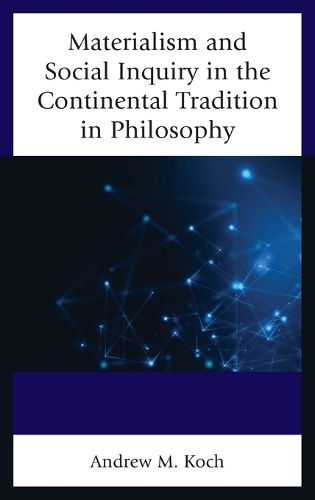
Materialism and Social Inquiry in the Continental Tradition in Philosophy
(Hardback)
Available Formats
Publishing Details
Materialism and Social Inquiry in the Continental Tradition in Philosophy
By (Author) Andrew M. Koch
Bloomsbury Publishing PLC
Lexington Books
4th August 2017
United States
Classifications
Professional and Scholarly
Non Fiction
Politics and government
146.3
Physical Properties
Hardback
158
Width 159mm, Height 238mm, Spine 18mm
417g
Description
The continental tradition in philosophy has gotten more materialistic over the last two hundred years. This has resulted from a combination of some very specific moves with regard to the epistemological parameters of understanding and the assertion that ideas may have material force in history. Therefore, the materialism within the continental tradition is not a materiality of being, but a materiality of understanding and action. Such an inquiry opens up space between the activities of sensation and the mental faculty of cognition. I think, therefore I am, is not an empirical statement, but a statement of cognition. It is assumed that this distinction is at the core of continental philosophy. Cognition is always interpretive. Experience is the start of cognition, but not its final product. Our cognitions cannot be separated from our experience of the physical, social, and cultural environment around us. The symbolic nature of language reinforces the interpretive nature of our thoughts and ideas. Our language is, therefore, always projecting an implicit image of the world. Language is, therefore, always political. The materiality of these cognitive world-views is manifested in two ways. First, in their formation. They are the products of sensual contact with the world. Second, in their effects. They move people. It is a picture of the world which serves to shape the content and character of human behavior. Whether we want to call these phantoms of the mind, world-view, ideas, thoughts, cognitions, or any other term, the dual character of their materiality is secure. This work examines the threads materialist ideas running through the efforts of some major authors in the continental tradition in philosophy. A model of materialism is constructed in Chapter One and used to assess the materialist elements in works from Kant, Marx, Weber, Nietzsche, and contemporary poststructuralism. The work demonstrates the evolution of materialist thinking within the tradition and asserts an evolving and developing articulation of materialism in relation to the thoughts and activities of human beings.
Reviews
Koch (Appalachian State Univ.) provides a productive account of a materialist tradition within Continental philosophy. In lieu of the common narrative regarding Continental philosophy, which highlights the phenomenological tradition, Koch sheds light on an equally valuable tradition of materialist thought. Emphasizing (aspects of) materialism in Kant, Marx, Weber, Nietzsche, and the poststructuralists, he offers a contrast to the empiricist tradition of Hobbes and Hume as well as both positivism and phenomenology. He also takes Darwin to be a contributor to this tradition and gives his reader a concise defense for this. Scholars working in social theory, political theory, sociopolitical philosophy, and Continental philosophy will appreciate Kochs exploration of materialism. More specifically, this book will be worthwhile for those interested in the divide between metaphysics and epistemology, the functions of consciousness, or the conditions for cognition. Summing Up: Recommended. Upper-division undergraduates through faculty. * CHOICE *
Andrew Koch deftly identifies and critically examines the distinctive contributions of Kant, Marx, Darwin, Nietzsche, Weber, and French poststructuralism in the making of a postmetaphysical, social constructionist tradition of materialist social inquiry. Taken together, they yield ten guidelines and operating theses for contemporary materialist thinking. Particularly noteworthy is Kochs elaboration of an evolving cultural materialist analytic stream as well as his elevation of Darwin as a major influence on Western epistemology and social inquiry. The consequences of this materialism, Koch concludes, puts the world squarely in human hands. This book represents an important contribution to social and political philosophy. -- Wayne Gabardi, Idaho State University
InMaterialism and Social Inquiry in the Continental Tradition in Philosophy,Andrew M. Koch explores howmaterialist understandings of consciousnesshave emerged historically. His perceptive readings of Kant, Marx, Weber, Nietzsche, and the poststructuralists,Baudrillard, Derrida, and Foucault,trace the ongoing movement towardmaterialism in Continental philosophy. Eloquently written, Materialism and Social Inquiry continually returnsits readersto material reality, and reminds us of the relationships between consciousness and life. -- Nancy Love, Appalachian State University
As Andrew Koch so elegantly demonstrates, the divide between epistemology and metaphysics can never be unified into a systematic whole, wherein truth and knowledge are synonymous. Citing Kants attempt to reconcile Hume and Descartes empiricism and rationalism respectively, we are left to rely on the primacy of conditions of cognition as our mode of knowledge acquisition. From Kochs impressive foray into Kants philosophy and his insights into the thought of Marx, Hegel, Nietzsche, Husserl el al., this work falls cogently into place. In the end, we are left with a novel prospective on a topic that has run the historical gamete in philosophy: epistemology, now endowed by Koch and to a lesser extent others, with a political status. Philosophers and political theorists alike will appreciate the insightful nature of this work. Owing to the lucid writing style, it is equally accessible to both the student and professional philosopher. -- Jesse Taylor, Appalachian State University
Author Bio
Andrew M. Koch is professor of political philosophy at Appalachian State University.
